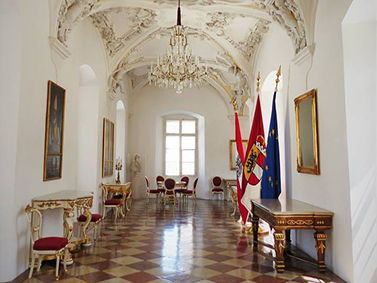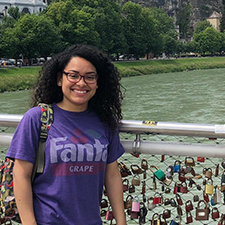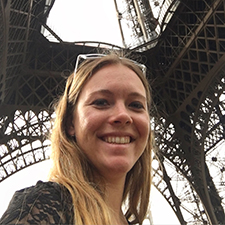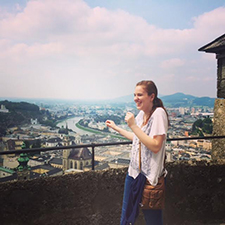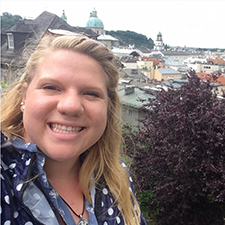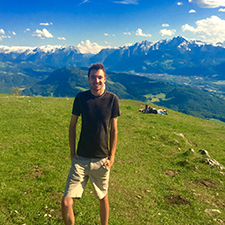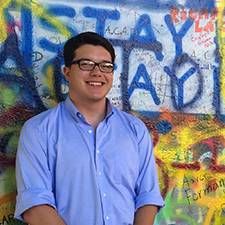Salzburg
Dates
May 22 – June 21, 2025
Subjects
Music – History, Conducting, Entrepreneurism, Literature, Theory
Deadlines
Dec. 1: Apply Early & Save $100
Feb. 5: Regular Deadline
Program Overview
The KIIS summer program in Salzburg, Austria offers you a unique opportunity to study, practice, and study the performing arts in this beautiful European city. Birthplace of Mozart and home to the world-famous Mozarteum, Salzburg has long been renowned as an international and historical performing arts center. Salzburg also is a city of stunning architecture. Founded in the 8th Century, Salzburg displays evidence of Roman culture, the Middle Ages (notably the Festung), and wonderfully-preserved Baroque buildings. Situated on the banks of the Salzach River, nestled near the Alps, home to three universities, and filled with hospitable people, Salzburg indeed is a magical city. The program also includes a day trip to Munich and an overnight excursion to Vienna.
Note: Studying abroad likely is more physically strenuous than you are used to at home. KIIS study abroad programs typically involve approx. 5-10 miles of walking (approx. 10,000-20,000 steps) or the like in a day, including the possibility of walking, hiking, and climbing stairs in heat and humidity, over elevations at higher altitudes, and over rocky terrain. See Health & Wellness for more information.
All KIIS course credit is awarded by Western Kentucky University. Prior to your KIIS program, please speak with your home campus academic advisor and/or study abroad office to determine course equivalencies. Grades will be transferred to your home institution in mid-August after the completion of the program. Course offerings are subject to change according to enrollment. For more information, visit Transcripts & Grades.
What's Included
Program Cost: $5,495 + airfare
To help you budget, keep in mind that you are responsible for the cost of obtaining a passport ($165), weekend lunches and all dinners + personal expenses (approx. $500-$1000 depending on your food tastes/spending habits/optional independent travel preferences), optional private lessons with Salzburg professionals, any class readings/materials, and any fees from your college/university.
Although KIIS tries to foresee all possible expenses in formulating program fees, please note that dramatic fluctuations in foreign currency valuations and/or airline surcharges may affect the total cost of the program.
Group Flight
Estimated Cost: $1,900 – $2,000
The Salzburg program offers a group flight option where you can travel to/from Salzburg with other students and faculty. If you choose this option, KIIS will purchase a roundtrip flight ticket for you. The flight cost will be added to your final program fee on April 1. The group flight will depart from Cincinnati or Louisville and fly to Munich, Germany where the group will then travel together to Salzburg, Austria.
If not selecting the group flight, you are responsible to purchase your individual flight.
The flight to Munich, Germany is overnight arriving the following morning. On the return, the flight from Munich, Germany to the USA departs and arrives on the same day. Visit Flights and Passports & Visas for more information.
Student Voices
Take Your Education Further
Description
Dates
May 22 – June 21, 2025
Subjects
Music – History, Conducting, Entrepreneurism, Literature, Theory
Deadlines
Dec. 1: Apply Early & Save $100
Feb. 5: Regular Deadline
Program Overview
The KIIS summer program in Salzburg, Austria offers you a unique opportunity to study, practice, and study the performing arts in this beautiful European city. Birthplace of Mozart and home to the world-famous Mozarteum, Salzburg has long been renowned as an international and historical performing arts center. Salzburg also is a city of stunning architecture. Founded in the 8th Century, Salzburg displays evidence of Roman culture, the Middle Ages (notably the Festung), and wonderfully-preserved Baroque buildings. Situated on the banks of the Salzach River, nestled near the Alps, home to three universities, and filled with hospitable people, Salzburg indeed is a magical city. The program also includes a day trip to Munich and an overnight excursion to Vienna.
Note: Studying abroad likely is more physically strenuous than you are used to at home. KIIS study abroad programs typically involve approx. 5-10 miles of walking (approx. 10,000-20,000 steps) or the like in a day, including the possibility of walking, hiking, and climbing stairs in heat and humidity, over elevations at higher altitudes, and over rocky terrain. See Health & Wellness for more information.
All KIIS course credit is awarded by Western Kentucky University. Prior to your KIIS program, please speak with your home campus academic advisor and/or study abroad office to determine course equivalencies. Grades will be transferred to your home institution in mid-August after the completion of the program. Course offerings are subject to change according to enrollment. For more information, visit Transcripts & Grades.
What's Included
Program Cost: $5,495 + airfare
To help you budget, keep in mind that you are responsible for the cost of obtaining a passport ($165), weekend lunches and all dinners + personal expenses (approx. $500-$1000 depending on your food tastes/spending habits/optional independent travel preferences), optional private lessons with Salzburg professionals, any class readings/materials, and any fees from your college/university.
Although KIIS tries to foresee all possible expenses in formulating program fees, please note that dramatic fluctuations in foreign currency valuations and/or airline surcharges may affect the total cost of the program.
Group Flight
Estimated Cost: $1,900 – $2,000
The Salzburg program offers a group flight option where you can travel to/from Salzburg with other students and faculty. If you choose this option, KIIS will purchase a roundtrip flight ticket for you. The flight cost will be added to your final program fee on April 1. The group flight will depart from Cincinnati or Louisville and fly to Munich, Germany where the group will then travel together to Salzburg, Austria.
If not selecting the group flight, you are responsible to purchase your individual flight.
The flight to Munich, Germany is overnight arriving the following morning. On the return, the flight from Munich, Germany to the USA departs and arrives on the same day. Visit Flights and Passports & Visas for more information.



